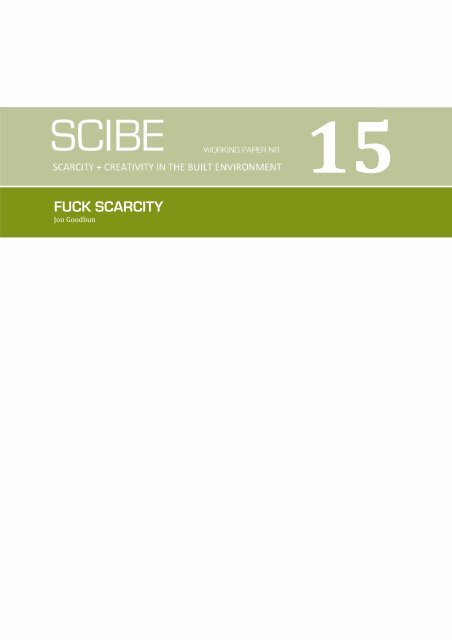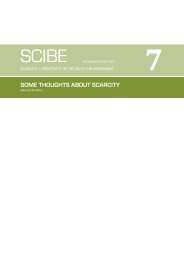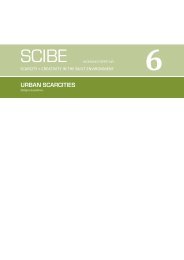FUCK SCARCITY - SCIBE
FUCK SCARCITY - SCIBE
FUCK SCARCITY - SCIBE
Create successful ePaper yourself
Turn your PDF publications into a flip-book with our unique Google optimized e-Paper software.
1<br />
15<br />
<strong>FUCK</strong> <strong>SCARCITY</strong><br />
Jon Goodbun
1<br />
<strong>FUCK</strong> <strong>SCARCITY</strong><br />
A Working Paper for <strong>SCIBE</strong><br />
Jon Goodbun<br />
15<br />
Material scarcity, as the great anarchist philosopher Murray Bookchin once<br />
noted – drawing heavily, it must be said, upon the insights of Karl Marx –<br />
has been a feature of human societies up to the present day:<br />
'until very recently, human society has developed around the<br />
brute issues posed by unavoidable material scarcity and their<br />
subjective counterpart in denial, renunciation and guilt.' 1<br />
The various forms of domination and inequality which have structured<br />
social relations within almost all human societies necessarily emerged out<br />
of the everyday reality of material scarcities. It was struggle over scarce<br />
resources which created the possibility, perhaps the necessity, for the<br />
production of structures of power in societies, in human selves, and against<br />
the wider living world. Bookchin again states that:<br />
'material society provided the historic rationale for the<br />
development of the patriarchal family, private property, class<br />
domination and the state; it nourished the great divisions that<br />
pitted town against country, mind against sensuousness, work<br />
against play, individual against society, and, finally, the<br />
individual against himself.' 2<br />
Bookchin shows how material scarcity must be understood as the<br />
connection between the two distinct modes of understanding alienation in<br />
1 Murray Bookchin, Post-Scarcity Anarchism 2nd Ed (Montreal: Black Rose Books, 1986), p.11.<br />
2 Ibid.
3<br />
<strong>FUCK</strong> <strong>SCARCITY</strong><br />
modernity as i. our individual alienation within and from oneself, and from a<br />
lived and sensuous engagement with matter, and ii. our collective<br />
estrangement from social production and the non-human natures which<br />
provide the context of all human practice in general. He concludes with a<br />
particularly useful definition, stating that:<br />
'scarcity is more than a condition of scarce resources: the<br />
word, if it is to mean anything in human terms, must<br />
encompass the social relations and cultural apparatus that<br />
foster insecurity in the psyche.' 3<br />
Michel Foucault similarly pays close attention to the historical<br />
development of human subjectivity under changing modes of scarcity. He<br />
describes how in the mercantilist period of capitalism – which dominated in<br />
Europe from the start of 17 th to the start of 18 th century – a particular set of<br />
practices and apparatus were developed to deal with the threat of scarcity.<br />
These practices were replaced in the 18 th century by the ideas of the<br />
physiocratic economists and the emergence of laissez-faire thinking: a<br />
different mode of dealing with the threat of material scarcity, and a different<br />
collective subjectivity.<br />
Foucault describes how mercantile capitalism organised grain<br />
production around an anti-scarcity system – notably characterised by price<br />
controls, prohibition of hoarding, limits on export (and also limits to amount<br />
of land to be cultivated to prevent excessive abundance) – primarily to<br />
prevent scarcity provoking revolt and political unrest in the cities and<br />
towns. He describes two general frameworks for thinking about<br />
'philosophical-political horizon' of scarcity as 'the juridicial-moral concept<br />
of evil human nature, of fallen nature, and the cosmological-political concept<br />
3 Ibid. p.13.
4<br />
Jon Goodbun<br />
of fortune.' 4 However, the mercantilist anti-scarcity system frequently<br />
failed, and the emerging physiocratic free marketeers 'tried to arrive at an<br />
apparatus for … working within the reality of fluctuations between<br />
abundance/scarcity, dearness/cheapness … which is, I think, precisely an<br />
apparatus of security and no longer a juridicial-disciplinary system.' 5<br />
Writing in 1793 one of the physiocrats, Louis-Paul Abeille stated that so<br />
long as there is free circulation in markets then 'scarcity is a chimera', and<br />
Abbot Ferdinando Galiani furthermore stated that 'scarcity is, for three<br />
quarters of the cases, a malady of the imagination'. 6 As something that<br />
afflicted an entire population at once (what Foucault calls the 'scarcityscourge')<br />
scarcity had indeed largely become a chimera, although this is<br />
replaced by a structural necessity for an anonymous some-of-thepopulation<br />
to endure scarcity, sometimes (which remains the basis for<br />
much of the capitalist apparatus today). While mercantile law re scarcity<br />
was based upon a set of prohibitions, price controls and a set of legal<br />
prohibitions or moral imperatives, under laissez-faire scarcity-capitalism<br />
Foucault find the origins of a contemporary apparatus of security:<br />
'the apparatus of security … "lets things happen." Not that<br />
everything is left alone, but laissez-faire is indispensable at a<br />
certain level: allowing prices to rise, allowing scarcity to<br />
develop, and letting people go hungry so as to prevent<br />
something else happening, namely the introduction of the<br />
general scourge of scarcity.'<br />
For Foucault the modern laissez-faire anti-scarcity system of dispersing<br />
scarcity through freer market mechanisms was more than just a more<br />
advanced form of capitalist organisation, it was a 'security apparatus' which<br />
4 Michel Foucault, Security, Territory, Population: Lectures at the College de France 1977-78 (NY:<br />
Pallgrave Macmillan, 2007), p.30.<br />
5 Ibid., p.37.<br />
6 Louis-Paul Abeille and Abbot Ferdinando Galiani both cited in Foucault, ibid., p.52.
5<br />
<strong>FUCK</strong> <strong>SCARCITY</strong><br />
constituted a new form of collective subjectivity – the atomised mass of<br />
'population':<br />
'a political subject, as a new collective subject absolutely<br />
foreign to the juridicial and political thought of earlier<br />
centuries is appearing here in its complexity, with its<br />
caesuras' 7<br />
Modern capitalism developed then, as a specific historical form of an<br />
apparatus of scarcity based upon an ideology of laissez-faire. David Harvey<br />
states that 'scarcity is socially organised in order to permit the market to<br />
function,' 8 whilst Andy Merrifield has similarly observes that:<br />
'The fundamental basis of a capitalist economy, of a society<br />
based on the profit motive, on exchange value and money<br />
relations, is scarcity – the active creation and perpetuation of<br />
scarcity.' 9<br />
For Bookchin however, the position of scarcity under capitalism does not<br />
stop at this point. The laissez-faire approach to structuring a capitalist<br />
economy coincided with massive developments and transformations in<br />
science, technology and manufacturing. Modernity, for the first time in<br />
human history, created the material possibility of what Bookchin describes<br />
as a 'post-scarcity society', a condition where all of the essential necessities<br />
of a life are delivered with a minimum amount of human labour. If the need<br />
to labour under the threat of scarcity had historically lay at the heart of all<br />
forms of oppression, inequality and alienation, both in societies and within<br />
selves, then for Bookchin post-scarcity describes 'fundamentally more than<br />
a mere abundance of the means of life: it decidedly includes the kind of life<br />
7 Ibid., p.42.<br />
8 David Harvey, Social Justice and the City (Baltimore: Johns Hopkins University Press, 1973),<br />
p.114.<br />
9 Andy Merrifield, Magical Marxism: Subversive Politics and the Imagination (London: Pluto,<br />
2011), p.96.
6<br />
Jon Goodbun<br />
these means support.' 10 . Writing in the early nineteen-seventies, he argues<br />
that:<br />
'the industrial capitalism of Marx's time organised its<br />
commodity relations around a prevailing system of material<br />
scarcity; the state capitalism of our time organises its<br />
commodity relations around a prevailing system of material<br />
abundance. A century ago scarcity had to be endured, today it<br />
has to be enforced.' 11<br />
The condition today is arguably even more full of complexity and<br />
contradiction. Conceptions of post-scarcity society continues to animate<br />
much of the political imaginary of both of the great liberation philosophies<br />
of modernity – anarchism and communism. Terry Eagleton has recently<br />
restated how Marx's greatest contribution to the then already existing idea<br />
of communism was to realise that it must have a material basis, and<br />
Bookchin agrees that:<br />
'to have seen these material preconditions for human freedom,<br />
to have emphasised that freedom presupposes free time and<br />
the material abundance for abolishing free time as a social<br />
privilege, is the great contribution of Karl Marx to modern<br />
revolutionary theory.' 12<br />
But we also find an interesting post-scarcity discussion happening in<br />
more mainstream arenas. Philip Sadler is one example of a contemporary<br />
business theorist who is optimistically arguing that capitalism will<br />
necessarily pass through a wholesale and largely 'unforeseen'<br />
transformation in the coming decades, referring to many tendencies that<br />
10 Ibid., p.13.<br />
11 Bookchin, ibid., p.102.<br />
12 Ibid., p.102.
7<br />
<strong>FUCK</strong> <strong>SCARCITY</strong><br />
would not be out of place in a more Marxian or autonomist setting, such as:<br />
falling costs of production, open-source intellectual property and<br />
collaborative working etc. Sadler argues that<br />
'although the need for system change is widely accepted, there<br />
is little recognition of the need to adjust to post-scarcity<br />
conditions and to base policies and decisions on the principles<br />
of the economics of abundance rather than on the economics<br />
of scarcity' 13<br />
There are of course however significant differences between anarchocommunist<br />
visions of post-scarcity, and more capitalist ideas of commodity<br />
abundance. Indeed, it is difficult to see how the contradictions of capitalism<br />
will not necessarily derail any possibility of a capitalist condition of postscarcity.<br />
In fact, the prospect of post-scarcity is a spectre haunting<br />
capitalism. The overwhelming tendencies are for the marginal costs of<br />
production to fall, and for the rate of profit to fall. Capitalist organisations<br />
have to constantly struggle to find ways to make a profit out of production.<br />
This involves designing-in redundancy and failure into products that could<br />
in many cases last generations rather than months or years. It involves<br />
developing highly proprietary parts and systems such that commodities<br />
cannot be repaired, and of course the projection of a vast spectacular<br />
infrastructure of advertising and branding that diverts the revolutionary<br />
libido and makes this insane situation seem desirable. All of these processes<br />
and many more serve to create imaginary scarcities, and furthermore real<br />
scarcities through the wastage of materials and the pollution and<br />
destruction of the ecosystems that we rely upon for resources. And there<br />
are of course important relations between scarcity and environmental<br />
degradation: polluted and damaged environments produce less). Indeed,<br />
13 See Philip Sadler, Sustainable Growth in a Post-Scarcity World (Farnham: Gower, 2010),<br />
p.236.
8<br />
Jon Goodbun<br />
Eagleton has argued that standing within sight of an era of post-scarcity,<br />
capitalism is gravitating towards ecological catastrophe as the best means of<br />
perpetuating the era of scarcity. If Marx realised that the overcoming of<br />
scarcity was a precondition of most paths to communism, Eagleton<br />
speculates whether the emerging ecological crisis is a mechanism for<br />
historically precluding those possible futures.<br />
However, the same deep contradictions of the capitalist process are<br />
structuring scarcity today in what are arguably even more profound ways.<br />
As already stated, the primary tendencies in production are for both costs<br />
and profits to fall. Yet as David Harvey has recently shown, the quantity of<br />
capital circulating in the global economy looking for profitable investment<br />
opportunities is greater than ever before. Since production is increasingly<br />
unable to provide capitalists, pension funds and the like with profitable<br />
investment opportunities, new avenues of speculative investment have been<br />
found through investing in assets. Property, land and housing are typical<br />
investment routes, but so are mineral and agricultural assets, and because<br />
this kind of widespread investment necessarily has a ponzi character (if<br />
everyone does it values increase), it can seem to work. Such investment<br />
strategies have of course been behind a series of asset and share price<br />
crashes and 'market failures' since the seventies. The kinds of assets that are<br />
being targeted by investment funds have in recent years have further<br />
widened. Beyond new technologies providing one new route of speculation<br />
(remember the dot com bubble), food is increasingly an investment<br />
opportunity, and this is becoming a significant source of food scarcity and<br />
food price inflation (although there are many other fundamentals that will<br />
be pushing up global food prices in the near and medium term, notably<br />
climate change) 14 .<br />
14 See discussion with John Beddington and Deborah Duanne on coming food price rises and<br />
scarcity on BBC Today programme 2.1.13
9<br />
<strong>FUCK</strong> <strong>SCARCITY</strong><br />
We find ourselves today in a paradoxical situation in a highly unevenly<br />
developed world. Bookchin, Marx, Marcuse and many others all remind us<br />
that we quite recently stood at the gates of a post-scarcity society, and<br />
indeed, since the middle of the twentieth century, if not earlier, it would<br />
have been perfectly possible to reorganise human society such that there<br />
was an abundance of good food and water, and a rewarding advanced<br />
industrial-ecological urban environment and global landscape for the global<br />
human population. (And those responsible for precluding that possibility<br />
should be tried for crimes against humanity.)<br />
Tragically, today the very possibility of a post-scarcity society seems to<br />
be slipping over the horizon, and is barely imaginable ... but it is not gone<br />
yet. Rather than the liberation of really-free-time (the ultimate scarcity),<br />
many of us today find ourselves today in the appallingly paradoxically<br />
compulsion to work constantly under conditions of affluenza, to become<br />
ever poorer. Yet in other parts of the world, but also just a few streets away<br />
from us, fellow human beings are living under conditions of abject poverty.<br />
At the same time, a newly constructed threat of scarcity shadows our<br />
near future. It is estimated that there will be 10 billion extra humans added<br />
to global population in the next decade. While we deal with the implications<br />
of that, climate change events multiplied by the apparent endgame of this<br />
phase of capitalism suggest the very actual potential for massive real<br />
scarcities across both developed and developing countries. Many of the new<br />
scarcities produced by climate and environmental change will manifest<br />
themselves through space, and there will be new forms of environmental<br />
and spatial scarcity produced...<br />
But we must not forget that constantly through these processes,<br />
capitalist scarcity also alienates us from a proper understanding of our<br />
relation to nature, and to the rest of the world. It turns the world into what<br />
Heidegger called a 'standing reserve'. There is a sense in which the very idea<br />
that resources are running out is itself a huge misunderstanding, a form of<br />
alienated thinking. Capital in this sense alienates us from a creative,
10<br />
Jon Goodbun<br />
sensuous and social grasp of our relationship to resources (or whatever<br />
word we should use): to matter and life.<br />
We must not allow the current normative conception of scarcity to<br />
continue to dominate... it is thoroughly ideological, and hides the reality that<br />
there is still the possibility of choosing post-scarcity. And of course, postscarcity<br />
thinking still needs a way to conceptualise the possibility of scarcity<br />
and how it – post-scarcity as a social form – will guarantee the holding of the<br />
possibility of an actual scarcity-scourge in permanent abeyance.<br />
A critique of the capitalist conception of scarcity involves a reexamination<br />
of both the concept of the commons, and the productionapparatus<br />
of contemporary subjectivity. Much work has been done in this<br />
area in different-though-interrelated ways, by for example Harvey, Hardt<br />
and Negri, and various associated autonomia fellow-travellers, to name but<br />
a few. Our task is to make a specifically spatial contribution to thinking and<br />
acting around these questions, as architecture, cities and urbanisms are<br />
always some kind of mediation of modes of subjectivity.
11<br />
<strong>FUCK</strong> <strong>SCARCITY</strong><br />
WWW.<strong>SCIBE</strong>.EU<br />
Author: Jon Goodbun, University of Westminster<br />
Contact: jcgoodbun@mac.com<br />
Published: February 2013<br />
Design: Ben Kirk and Rosie McLaren<br />
Scarcity and Creativity in the Built Environment (<strong>SCIBE</strong>) is a trans European<br />
research project that explores how conditions of scarcity might affect the<br />
creativity of the different actors involved in the production of the built<br />
environment, based on the analysis of processes in four European cities:<br />
London, Oslo, Reykjavik, and Vienna. <strong>SCIBE</strong> is funded by HERA – Humanities<br />
in the European Research Area, a partnership between 21 Humanities<br />
Research Councils across Europe and the European Science Foundation<br />
(ESF).<br />
The <strong>SCIBE</strong> Working Papers are published as work in progress in order to<br />
disseminate the progress of the project: they are thus discursive and<br />
provisional and should not be seen as the author’s or research team’s<br />
definitive take on the subject.<br />
This document is published under a Creative Commons License. This<br />
means that you are free to distribute it and quote from it, but that in each<br />
case the original must be attributed, acknowledging the author, paper title,<br />
date, and <strong>SCIBE</strong> website (www.scibe.eu) as the source.




